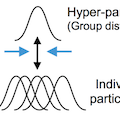Abstract
Reinforcement learning and decision-making (RLDM) provide a quantitative framework and computational theories, with which we can disentangle psychiatric conditions into basic dimensions of neurocognitive functioning. RLDM offer a novel approach to assess and potentially diagnose psychiatric patients, and there is growing enthusiasm on RLDM and Computational Psychiatry among clinical researchers. Such a framework can also provide insights into the brain substrates of particular RLDM processes as exemplified by model-based functional magnetic resonance imaging (fMRI) or electroencephalogram (EEG). However, many researchers often find the approach too technical and have difficulty adopting it for their research. Thus, there remains a critical need to develop a user-friendly tool for the wide dissemination of computational psychiatric methods. We introduce an R package called hBayesDM (hierarchical Bayesian modeling of Decision-Making tasks), which offers computational modeling on an array of RLDM tasks and social exchange games. The hBayesDM package offers state-of-the-art hierarchical Bayesian modeling, where both individual and group parameters (i.e., posterior distributions) are estimated simultaneously in a mutually constraining fashion. At the same time, it is extremely user-friendly: users can perform computational modeling, output visualization, and Bayesian model comparisons-each with a single line of coding. Users can also extract trial-by-trial latent variables (e.g., prediction errors) required for model-based fMRI/EEG. With the hBayesDM package, we anticipate that anyone with minimal knowledge of programming can take advantage of cutting-edge computational modeling approaches and investigate the underlying processes of and interactions between multiple decision-making (e.g., goal-directed, habitual, and Pavlovian) systems. In this way, it is our expectation that the hBayesDM package will contribute to the dissemination of advanced modeling approaches and enable a wide range of researchers to easily perform computational psychiatric research within their populations.
